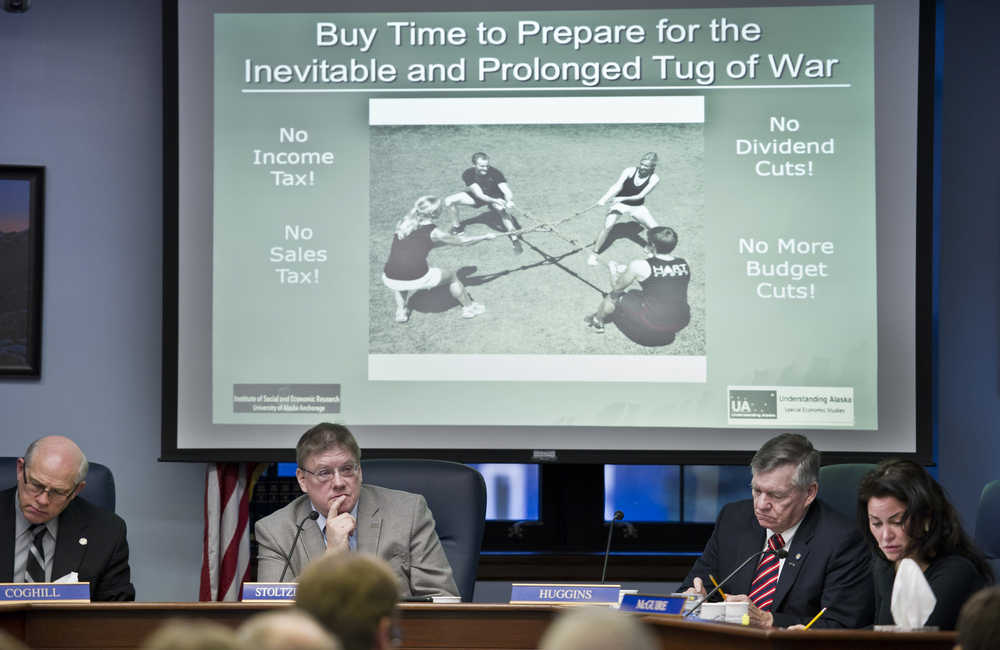Sen. Bill Wielechowski knows the state needs to balance its budget. The Anchorage Democrat just wants to make sure that Alaskans’ Permanent Fund Dividend isn’t a price of that balancing act.
For the third consecutive Legislature, Wielechowski is proposing a constitutional amendment that would guarantee the dividend for good.
In proposing dividend-focused legislation, Wielechowski won’t be alone this time. Sen. Mike Dunleavy, R-Wasilla, will introduce a measure to restore the $1,000 per-person payment vetoed by Gov. Bill Walker last year. Rep. David Eastman, R-Wasilla, will pre-file a companion bill in the House.
“I’m going to prefile the PFD Restoration Act,” Eastman said.
The dividend was a touchy topic last session as lawmakers pondered a cap on dividend payments alongside a diversion of some Permanent Fund proceeds to state government. The cap was considered necessary to maximize the amount of money available to state services.
In the end, Senate Bill 128 failed to gain House approval and died at the end of the Legislature.
After the session ended, Walker cut $600 million from the $1.2 billion appropriation for the dividend, effectively reducing the per-person payout from $2,000 to $1,000.
As lawmakers prepare to readdress plans to use Permanent Fund revenue for state expenses, Wielechowski says a dividend guarantee is critical to build popular support.
“I think if the Legislature wants to restructure the Permanent Fund … probably the only way you could get people to support it is if you can ensure they continue to get a dividend,” Wielechowski said. “If you guarantee the dividend, then I think that’s a big selling point for a lot of Alaskans.”
In 2013, Wielechowski proposed SJR 13, which never received a hearing. In 2014, it was SJR 1, which passed out of the Senate State Affairs Committee but never passed out of the Senate Judiciary Committee.
When Gov. Bill Walker vetoed half of the Permanent Fund Dividend in 2016, Wielechowski sued and lost in superior court. The case is still pending on appeal.
Wielechowski said the proposed constitutional amendment — which would set in stone the formula used to calculate the 2015 dividend — follows the strategy he’s been following for a long time.
But does Wielechowski’s idea make sense if — as will be discussed this year — the Legislature enacts a statewide sales tax or income tax?
After all, if that tax passes and so does Wielechowski’s amendment, the state’s government would effectively be taking from one hand and giving from another.
Wielechowski doesn’t see it that way. In fact, he doesn’t think a sales or income tax is necessary at all — if the state restores oil taxes to their historic average.
“If you simply restructure the oil taxes to get our historic 30 percent, it brings in $4.2 billion,” Wielechowski said. “You just about completely eliminate the deficit.”
Raising oil taxes would be a tough sell in the Republican-led Senate and even in the House, where a coalition majority rules.
“I can’t have it unless I try,” Wielechowski said.
While Wielechowski is looking at future dividends, Dunleavy is looking at the past. In October, he announced that he will file a bill to restore the half of the 2016 dividend vetoed by Walker.
“The bill will be pre-filed as soon as possible,” he said at the time, “and I will ask for an expedited hearing when the Legislature convenes on Jan. 17, 2017.”

